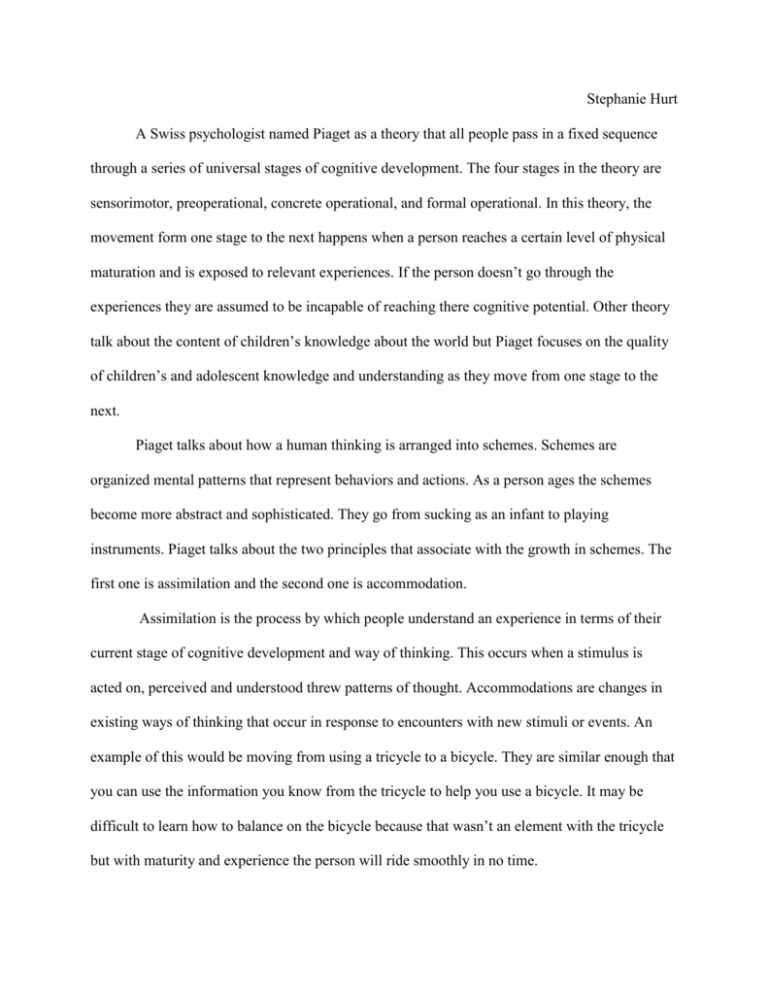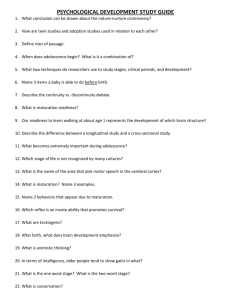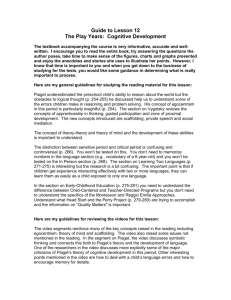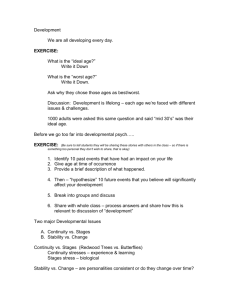Case Study 3 Adol
advertisement

Stephanie Hurt A Swiss psychologist named Piaget as a theory that all people pass in a fixed sequence through a series of universal stages of cognitive development. The four stages in the theory are sensorimotor, preoperational, concrete operational, and formal operational. In this theory, the movement form one stage to the next happens when a person reaches a certain level of physical maturation and is exposed to relevant experiences. If the person doesn’t go through the experiences they are assumed to be incapable of reaching there cognitive potential. Other theory talk about the content of children’s knowledge about the world but Piaget focuses on the quality of children’s and adolescent knowledge and understanding as they move from one stage to the next. Piaget talks about how a human thinking is arranged into schemes. Schemes are organized mental patterns that represent behaviors and actions. As a person ages the schemes become more abstract and sophisticated. They go from sucking as an infant to playing instruments. Piaget talks about the two principles that associate with the growth in schemes. The first one is assimilation and the second one is accommodation. Assimilation is the process by which people understand an experience in terms of their current stage of cognitive development and way of thinking. This occurs when a stimulus is acted on, perceived and understood threw patterns of thought. Accommodations are changes in existing ways of thinking that occur in response to encounters with new stimuli or events. An example of this would be moving from using a tricycle to a bicycle. They are similar enough that you can use the information you know from the tricycle to help you use a bicycle. It may be difficult to learn how to balance on the bicycle because that wasn’t an element with the tricycle but with maturity and experience the person will ride smoothly in no time. Adolescence goes through the formal operational stage. In this stage, people develop the ability to think abstractly. According to Piaget, it starts when a person reaches the start of adolescence around the age of 12. Using formal principles to solve problems benefits the adolescent because they now think abstractly rather than in concrete terms. With this skill adolescence are able to test their understanding by systematically carrying out basic experiments on problems and situations and observing what their experimental interventions. This stage in Piaget’s theory uses hypotheticodeductive reasoning. This means they start with a basic theory about what makes a certain outcome and then deduce explanations for specific situations in which they see that outcome. Basically, it like in science class when you have a theory and then you test it out to see if it has the outcome you thought it would have. During this formal operational stage, propositional thought occurs. This is reasoning that uses abstract logic in the absence of concrete examples. Piaget makes an interesting point that when an adolescent starts this stage all of the capabilities don’t just appear. They develop slowly and appear through a combination of physical maturation and environmental experiences. That’s why 21 years olds are more mature mentally then a 12 year old but it depends on the person. Some people aren’t mature and have the mental capacity of at 12 years old when they are 16. Another interesting thing Piaget said is that some people don’t fully develop this until later and some don’t use it at all. Some people don’t use formal operational thinking constantly. One reason for that is that people are lazy and rely on intuition and mental shortcuts rather than formal reasoning. People are also more eager to use thinking abstractly to something familiar to them because people find unfamiliar situations more difficult to apply formal operations. Another interesting aspect Piaget talks about is that adolescence differs in their use of formal operational because of the culture in which they were raised. Andre lives in a neighborhood where he sees acts of violence every day. That is his cultural norm. Adolescence that live in isolated areas lack scientific orientation and have barely any formal education is less likely to perform at a formal operational level than an educated person living in a culture with a lot of technology. When adolescence transition to this stage they become more argumentative. They find happiness using abstract thinking to poke holes into people’s explanations. That’s why when parents tell them not to cuss and then the parents cuss the adolescent never lets them forget it. This ability can be a good thing and a bad thing. Bad because it can drive the parent, teacher, and/or supervisor crazy because they are questioning all the time. Good because it can make the adolescent more interesting, actively seeking to understand the values and justifications that they encounter in their lives. In this case study, 15 year old Andre was recently arrested for armed robbery. He believed that adults would follow him home and harm his grandparents and siblings He decided that the only way his family would not be harmed was if he left home but he needed money to leave home, so he robbed a cab driver. In his head, protecting his family justified robbing someone. Adolescence has egocentrism. This is a state of self-absorption in which the world is viewed from one’s own point of view. The adolescent develops capabilities to introspect and examine their own thinking. The video state of mind that Andre has is he’s developing what is called an imaginary audience. This is a fictitious observer who pays as much attention to adolescent’s behavior as they do themselves. This involves the adolescent’s egocentrism first hand. An example of this would be Andre believing that adults would follow him home and harm his family. That was just the first distortion adolescents can have and the second is called a personal fable. A personal fable is the view held by some adolescents that what happens to them is unique, exceptional, and shared by no one else. In Andre’s case, this would be his thought that no one has been in a situation where they need money so much and it’s ok for me to rob a cab driver because of it. He hasn’t fully developed the ability to make an abstract decision/thought so I think the court’s assessment of his guilt should differ to less.





